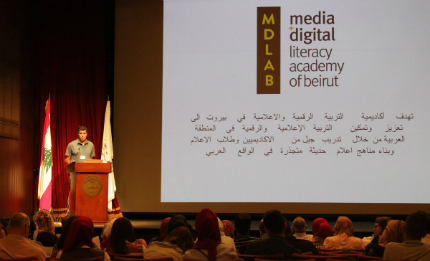Dr. Salamey at MDLAB Panel on Bridging the Gap Between Theory and Practice
As part of the Media Digital Literacy Academy of Beirut’s 2017 program, the Institute of Media Research and Training at the Lebanese University hosted a panel exploring the role of practitioners and academics in conflict resolution on Thursday.
The panel, which looked to bridge the gap between practice and theory in regional conflict resolution, featured Imad Salamey, associate professor at LAU and director of LAU’s Institute for Social Justice and Conflict Resolution; Manal Omar, associate vice president at the United States Institute for Peace; May Aoun representing War Child Holland; Elie Al-Hindy from Notre Dame University; and Youness Abouyoub from the United National Economic and Social Commission for Western Africa.
 Dr. Salamey, whose research focuses on communitarian conflicts, stressed the need for incorporating local perspectives when addressing conflict resolution in the Middle East/North Africa region, in addition to strengthening methodologies through collaboration with academia. Omar, who heads USIP’s Middle East and Africa Center, discussed the necessity of cooperation between academicians and practitioners in order to bring about regional change. Drawing from her own extensive conflict resolution experiences on the field, Omar emphasized the importance of addressing trauma and the multiple drivers for each conflict when seeking to resolve or transform them.
Dr. Salamey, whose research focuses on communitarian conflicts, stressed the need for incorporating local perspectives when addressing conflict resolution in the Middle East/North Africa region, in addition to strengthening methodologies through collaboration with academia. Omar, who heads USIP’s Middle East and Africa Center, discussed the necessity of cooperation between academicians and practitioners in order to bring about regional change. Drawing from her own extensive conflict resolution experiences on the field, Omar emphasized the importance of addressing trauma and the multiple drivers for each conflict when seeking to resolve or transform them.
Aoun’s organization, War Child Holland, is an international NGO that seeks to empower children and youth in conflict zones through psychosocial support. Aoun reflected on her work with Syrian refugees to observe the gap between researchers who approach their methodology from a European or western-centric perspective, in contrast to practitioners with field experience and an understanding of community practices. Youness’ work in Libya and Yemen, among other regional experiences, shed light on the benefits and drawbacks to a practitioner’s perspective on the field in contrast with academia’s theoretical and analytical approach, leading to the need for bridging the gap between the two. Al-Hindy also emphasized that practitioners themselves have a vested interest in working alongside academia in order to identify best practices, analyze the applicability of theories, and contextualize knowledge gained.
The panel comes at the heels of a joint conference held by LAU’s ISJCR and USIP, in which the organizations launched two resource books exploring regional peacebuilding, conflict mediation, and dialogue facilitation in MENA.
For the full panel discussion, click here.